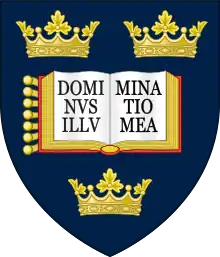Research Laboratory for Archaeology and the History of Art
The Research Laboratory for Archaeology and the History of Art (RLAHA) is a laboratory at the University of Oxford, England which develops and applies scientific methods to the study of the past. It was established in 1955 and its first director was Teddy Hall.[1] The first deputy director was Dr Stuart Young, who was followed by Martin Aitken in 1957.[1] After many years of de facto association with the Institute of Archaeology, in 2000 it was jointly brought under the single departmental umbrella of School of Archaeology.[2]
The laboratory includes the Oxford Radiocarbon Accelerator Unit (ORAU), which carries out radiocarbon dating using an accelerator mass spectrometer.[3] The Laboratory publishes the journal Archaeometry, and hosts a chair named for its first director, Edward Hall Professorship in Archaeological Science, and a seminar series named for Martin Aitkin.
The Laboratory is currently directed by Professor Mark Pollard.
Areas of Research, Past and Present
History of Directorship
- Teddy Hall, 1955-1989.[4]
- Mike Tite, 1989-2004.[4]
- Mark Pollard, 2004-2014.
- Christopher Bronk Ramsey 2014-2019.
- Mark Pollard, 2019–Present.[1]
Edward Hall Professorship in Archaeological Science
In 1989, when Teddy Hall retired, the laboratory was placed in jeopardy. In order for the University to agree to the funding of the Deputy Directorship in 1955, Hall, who was independently wealthy, forfeited his own salary.[5] Knowing that his replacement would require funding, he launched an appeal and raised a million pound endowment for a Chair, the now eponymous Edward Hall Professorship in Archaeological Science.
The first to take this chair was a previous student of Martin Aikten's, Mike Tite,[4] who also worked with the pair on dating the Turin Shroud.[6] Tite was Edward Hall Professor from 1989, until his retirement in 2004. He was replaced by Mark Pollard, who remains in post.
References
- RLAHA page on the Oxford University School of Archaeology website
- "School of Archaeology, University of Oxford", Wikipedia, 2 May 2020, retrieved 5 January 2022
- "Oxford Radiocarbon Accelerator Unit". Research Laboratory for Archaeology and the History of Art.
- "Mike Tite Has Retired After 15 Years as Edward Hall Professor of Archaeological Science and Director of the Research Laboratory for Archaeology and the History of Art". Archaeometry. 47 (1): i–ii. 2005. doi:10.1111/j.1475-4754.2005.00183.x.
- Pollard, A. Mark (2014), "Hall, Edward T.", in Smith, Claire (ed.), Encyclopedia of Global Archaeology, New York, NY: Springer New York, pp. 3189–3191, doi:10.1007/978-1-4419-0465-2_347, ISBN 978-1-4419-0426-3, retrieved 5 January 2022
- Damon, P. E.; Donahue, D. J.; Gore, B. H.; Hatheway, A. L.; Jull, A. J. T.; Linick, T. W.; Sercel, P. J.; Toolin, L. J.; Bronk, C. R.; Hall, E. T.; Hedges, R. E. M. (February 1989). "Radiocarbon dating of the Shroud of Turin". Nature. 337 (6208): 611–615. Bibcode:1989Natur.337..611D. doi:10.1038/337611a0. ISSN 1476-4687. S2CID 27686437.
External links
